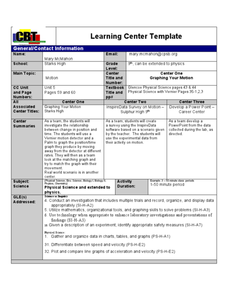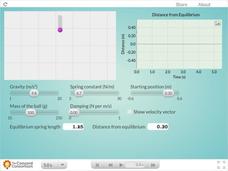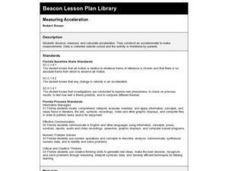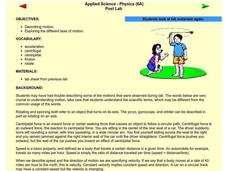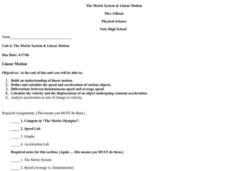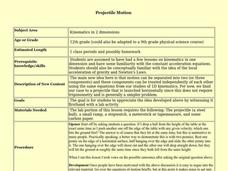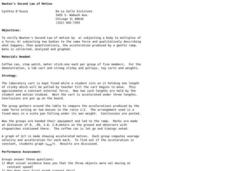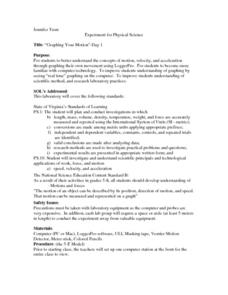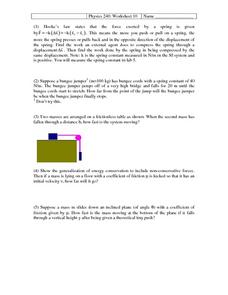Curated OER
Acceleration Lab
Young Einsteins experiment with the acceleration of Hot Wheels™ toy cars down inclined planes at various angles. This classic physics lab activity is thoroughly explained in both a teacher’s guide and a student lab sheet. Science...
Curated OER
Projectile Motion Lab
In this physics worksheet, students model the position, velocity and acceleration using mathematical formulas and a computer program. Then they interpret the parameters in each of the models. Students also complete the experiment and...
Curated OER
Waves Velocity & Particle Velocity
In this physics learning exercise, students examine a single wave pulse which travels down a slinky. Then they sketch a single ring of the slinky as the wave goes by and determine whether the wave is constant or not.
Curated OER
Activity One Teacher Page: Vehicles In Motion
Students identify variables that affect the system, and specify which variables are independent and which are dependent.
Texas State Energy Conservation Office
Investigation: Acceleration
Take a look at acceleration within the context of automotive technology. They vary the mass on a toy car and run it down a ramp, exploring Newton's second law of motion. Though this is a classic lab activity, you will appreciate the...
Rice University
College Physics for AP® Courses
Take a look at an organized physics course. The 34-section electronic textbook covers material in AP® Physics 1 and 2. Teachers use the text to supplement lectures and have the class work through the labs. Each section contains multiple...
Curated OER
"Graphing Your Motion"
Students study the concepts of motion, velocity, and acceleration through graphing their own movement using LoggerPro. They explain the difference between speed and velocity using the weather vane example. They discover the difference...
Curated OER
Slinky Movement Lab
In this wave worksheet, students use Slinky's to observe the properties of waves. They observe longitudinal waves, transverse waves, traveling waves and standing waves and record their observations. They calculate the frequency and...
Concord Consortium
Pendulum and Spring
Up, down, back, and forth. When you make a pendulum out of a spring, there's a lot to observe. Aspiring masters of motion examine the combined kinetic energies of spring and pendulum motion using a detailed interactive. Learners observe...
Concord Consortium
Spring and Mass
Here's a resource with more bounce for the ounce! Engage your physical science class with an interesting interactive that allows individuals to perform tests with a mass attached to a spring. Participants can customize the scenario by...
Curated OER
Straight Line Motion with a Stomper
Learners explore average speed, and graph distances and time. In this speed and velocity lesson students complete a lab then calculate distances, acceleration and velocity and graph the data.
LABScI
Kinematics: The Gravity Lab
Falling objects can be brutal if you don't protect your noodle! Scholars explore the motion of falling objects through measuring short intervals to determine if the distance traveled varies with time. Building off of this, scholars...
Curated OER
Measuring Acceleration
Students create an accelerometer and take measurements of acceleration in a moving car. They study the car speeding up in a straight line, slowing in a straight line and curving at constant speed. They prepare a lab report showing...
Bowels Physics
Projectile Motion
Hit a bullseye with an engaging presentation about the components of projectile motion. Viewers see how horizontal and vertical motion combine to create the parabolic path of projectile motion.
It's About Time
A Moving Frame of Reference
We often remind pupils to cite their references, but this lesson helps them understand there are many frames of reference. Scholars experiment with throwing a ball straight up in the air and catching it. Then they must do it again while...
Curated OER
Laws of Motion
Students explore centrifugal and centripetal force. In this motion lesson, students expand on their knowledge of motion to study velocity, acceleration, and friction. Students examine multiple objects to demonstrate the laws of motion.
Curated OER
Linear Motion
Students are able to build an understanding of linear motion. They are able to define and calculate the speed and acceleration of various objects. Students are able to differentiate betweeen instantaneous speed and average speed. They...
Curated OER
Go Car, Go!
Students design and build their own car. In this physics lesson, students collect data to determine the speed of the car. They plot the data on the graph analyze the relationship between variables.
Curated OER
WAVES AND PHOTONS
Learners examine the many types of electromagnetic waves, the concept of an EM wave, how James Clerk Maxwell proposed a slight modification of the equations of electricity, Heinrich Hertz and his radio-frequency, wavelengths, and light...
Curated OER
Projectile Motion
Twelfth graders experiment with a projectile that is launched horizontally after a demonstration and small discussion about two pennies, one dropping from a table top and the other being slide off the top and hitting the ground at about...
Curated OER
Speed Trap
Students conceptually explore motion graphing by producing motion at different speeds and directions. They experience the lab and then graph the motion of the truck at various speeds and directions. The procedures of velocity are...
Curated OER
Newton's Second Law of Motion
Sixth graders study Newton's second law of motion and verify it. For this force and motion lesson students complete a lab activity and collect data, analyze it and graph it.
Curated OER
Graphing Your Motion-Day 1
Ninth graders explore the concepts of motion, velocity and acceleration through graphing their own movement using LoggerPro. They become more familiar with the computer technology. Students explore graphing in real time and graph on...
Curated OER
Physics 240:10
In this physics 240:10 worksheet, students calculate the speed and distance as presented in the given word problems. Students apply their understanding of Hooke's law to answer the questions provided.








